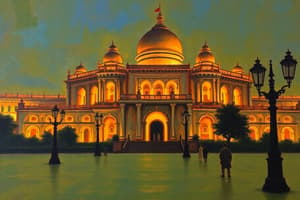Podcast
Questions and Answers
What is the minimum age requirement to be eligible to vote in the Lok Sabha general election?
What is the minimum age requirement to be eligible to vote in the Lok Sabha general election?
- 18 years
- 30 years
- 25 years (correct)
- 21 years
Which electoral system is used in the Lok Sabha general election?
Which electoral system is used in the Lok Sabha general election?
- First Past the Post (correct)
- Alternative Vote
- Proportional Representation
- Single Transferable Vote
What is the total number of elected members in the Lok Sabha?
What is the total number of elected members in the Lok Sabha?
- 550
- 543 (correct)
- 545
- 552
Which of the following is NOT considered a major political party in the Lok Sabha elections?
Which of the following is NOT considered a major political party in the Lok Sabha elections?
Who is responsible for administering election processes in India, including the Lok Sabha elections?
Who is responsible for administering election processes in India, including the Lok Sabha elections?
Which of the following statements about the voting process in the Lok Sabha elections is incorrect?
Which of the following statements about the voting process in the Lok Sabha elections is incorrect?
What happens usually within a week after the Lok Sabha elections are held?
What happens usually within a week after the Lok Sabha elections are held?
Which of the following challenges is faced during Lok Sabha elections?
Which of the following challenges is faced during Lok Sabha elections?
Flashcards are hidden until you start studying
Study Notes
Lok Sabha General Election
-
Definition: The Lok Sabha general election is a key democratic exercise in India, where members of the Lok Sabha (House of the People) are elected.
-
Frequency: Occurs every five years, but can be called earlier under certain circumstances.
-
Constitutional Basis: Governed by Articles 81 to 100 of the Constitution of India.
-
Electoral System:
- First Past the Post: Candidates are elected from single-member constituencies; the one with the most votes wins.
- Total Seats: 543 elected members in the Lok Sabha.
-
Eligibility:
- Must be a citizen of India.
- Minimum age of 25 years.
- Must be a registered voter.
-
Major Political Parties:
- Indian National Congress (INC)
- Bharatiya Janata Party (BJP)
- Regional parties (e.g., Trinamool Congress, DMK, AAP)
-
Election Commission: An autonomous constitutional authority responsible for administering election processes in India, including overseeing the conduct of Lok Sabha elections.
-
Conduct of Elections:
- Voter awareness campaigns.
- Use of Electronic Voting Machines (EVMs) and Voter Verified Paper Audit Trail (VVPAT).
- Polling stations set up across constituencies.
-
Voting Process:
- Secret ballot.
- Voters mark their choice on the EVM.
-
Post-Election:
- Counting of votes takes place, usually within a week after polling.
- Results are announced, and the party or coalition with a majority forms the government.
-
Significance:
- Determines the ruling government at the national level.
- Reflects the political will of the populace.
- Influences policy-making and governance.
-
Challenges:
- Electoral fraud and malpractices.
- Voter apathy and low turnout.
- Influence of money and muscle power.
This structured overview captures the essential elements of the Lok Sabha general election, offering a clear and concise reference for study.
Lok Sabha General Election Overview
- Definition: A significant democratic process in India for electing members to the Lok Sabha (House of the People).
- Frequency: Held every five years; earlier elections can be triggered by specific circumstances.
- Constitutional Framework: Regulated by Articles 81 to 100 of the Indian Constitution.
Electoral System
- Voting Mechanism: Employs a First Past the Post system where candidates from single-member constituencies are elected based on receiving the highest number of votes.
- Seat Count: Comprises a total of 543 elected representatives in the Lok Sabha.
Eligibility Criteria
- Citizenship: Must be a citizen of India.
- Age Requirement: Minimum age set at 25 years.
- Voter Registration: Must be a registered voter.
Major Political Parties
- Significant Parties:
- Indian National Congress (INC)
- Bharatiya Janata Party (BJP)
- Various regional parties, including Trinamool Congress, DMK, and AAP.
Role of the Election Commission
- Authority: An independent constitutional body responsible for overseeing the electoral process in India.
- Functions: Manages the conduct of Lok Sabha elections through defined processes.
Election Conduct
- Voter Education: Implements campaigns to raise awareness among voters.
- Voting Technology: Utilizes Electronic Voting Machines (EVMs) and a Voter Verified Paper Audit Trail (VVPAT) system.
- Polling Infrastructure: Establishes polling stations across various constituencies.
Voting Process
- Ballot System: Voting is conducted using a secret ballot where voters select candidates on the EVM.
Post-Election Procedures
- Vote Counting: Count of votes typically occurs within a week after the election.
- Result Declaration: Announcements made to declare the party or coalition with a majority, which then forms the government.
Significance of Elections
- Government Formation: Determines the ruling political party at the national level.
- Public Representation: Reflects the collective political preferences of the electorate.
- Policy Influence: Plays a crucial role in shaping governance and public policy.
Election Challenges
- Fraud and Malpractices: Issues related to electoral misconduct and corruption.
- Voter Turnout: Concerns over voter apathy leading to low participation rates.
- Undue Influences: Problems with the impact of financial power and coercion in the electoral process.
Studying That Suits You
Use AI to generate personalized quizzes and flashcards to suit your learning preferences.




